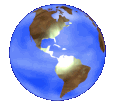INTRO TO ENVIRONMENTAL STUDIES
During Fall and Winter
quarters our goal is to examine the relationship between humans and the
environment, in terms of the historical development of that relationship
and the interplay between human social philosophies and changing conceptualizations
of nature that have developed in ecological science. We will develop
an understanding of contemporary views of nature and the human-nature interaction
from both social science and natural science perspectives.
To make this scheme manageable
we will work with the five interdisciplinary categories listed below, in
each case 1) developing concepts and theories in comparative natural and
human contexts; and 2) using historical and contemporary examples, with
a particular eye to those concerning the Pacific Northwest.
We will examine the first
and second categories in Fall quarter, the third, fourth, and fifth in
Winter quarter.
First, Distribution
and Abundance: Nature: commonness and rarity of species,
community structures, spatial distribution. Humans:
population distribution relative to resources.
Second, Competition
and Cooperation: Nature: predation, mutualism, altruism,
symbiosis, parasitism, commensualism, exploitation vs. interference mechanisms,
realized vs. potential niches. Humans: principles of
capitalism: power as access to and control over resources, property,
imperialism and globalization. Historical conflicts with indigenous
societies.
Third, Change:
Nature: organic evolution, genetics, selection, speciation, punctuated
equilibrium, gradualism. Humans: cultural vs. genetic
evolution, gradual vs. revolutionary change.
Fourth, Equilibrium
vs. Non-equilibrium: Nature: Balance of nature, island
biogeography. Humans: progress, development vs. preservation,
sustainability.
Fifth, Diversity:
Nature: homogeneity-heterogeneity, habitat disturbance, management
policies for diversity. Valuing diversity, ecosystem services.
Humans: the Coca-Colanization of the world and resistance,
multiculturalism, romance/realism.
We will use a diverse combination
of approaches to learning, including hands-on research in the Library,
the field, and the community. We will also have substantial readings
in the natural and social sciences focused on the environment. There
will be ample discussion, tests, academic field trips, and writing assignments.
Please note that in order to ensure that students have read material assigned
for lecture periods, we will have frequent quizzes.
 PORTFOLIOS
PORTFOLIOS
You are responsible for maintaining
a complete portfolio of your work for the program. It should contain
your responses to quizzes and exams, your journal, the rough drafts and
final copies of your essays, and any other writing or evidence of your
work. You will organize it by category and date, and hand it to your
seminar leader to inform her/his evaluation of you at the end of each quarter.
Please Note:
It is your responsibility to make xeroxes of your
work as insurance against loss.
FACULTY
Office
Phone
Office Hours
Peta Henderson
Lab II 3253
6760
W, 9-10, and by appt.
Peter Pearman
Lab I 3012
6543
W, 1-2, and by appt.
Brian Price
Lab I 1006
6743
W, 9-10, and by appt
Program Secretaries
Pam Udovich
Lab I 1020
6600
Tony Leahy
Lab I 1018
WEEKLY
SCHEDULE
TEXTS
IES
STUDENTS

